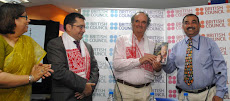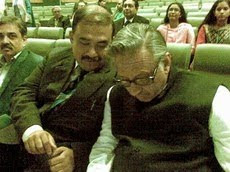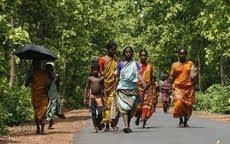Paresh Barua has recently hailed Prabhakaran as one of the greatest revolutionaries of all time, a great freedom fighter whose example will continue to inspire all who fight for freedom. It is natural that Barua will say all this because the ULFA has not only been influenced by the LTTE's example but have actually got a lot of help from the Tamil Tigers. LTTE Colonel Rajan first visited the ULFA camps at Lakhipathar and Saraipung and advised Paresh Barua on how he should fight the Indian army . That was the time in the late 1980s when an Indian military offensive against the ULFA was looking imminent. It is also not known to most of Indian intelligence and police who loudly boast of knowing everything about the ULFA that Prabhakaran put

 Paresh Barua in touch with some arms dealers of Tamil origin in Southeast Asia , so that the ULFA could access the thriving weapons blackmarket in Southeast Asia .
Paresh Barua in touch with some arms dealers of Tamil origin in Southeast Asia , so that the ULFA could access the thriving weapons blackmarket in Southeast Asia .Some of the top arms dealers in Southeast Asia are people of Tamil origin -- the Karikal Muslims. Karikal like Pondicherry in South India was a French colony until 1952 and its large Muslim population are traders who went and settled down in French Indo-China in large numbers . Those of them who nsettled down in Cambodia had strong connections with the Khmer Rouge -- and Prabhakaran started using them for securing a steady supply of weapons and ammunition when he fell out with India and Delhi send the IPKF to tame the Tamil Tigers. Some of these people were introduced to Paresh Barua and through them the ULFA got access to fresh supplies of Chinese weapons because the Khmer Rouge had strong connections which was picked by these arms traders from Karikal.
 Barua learnt much of his global networking -- on the arms procurement front, on the financial front, on the political liasion front -- from Prabhakaran. My good friend Bertil Lintner, one of the best journalists based in Southeast Asia and who knows the insurgents based in Thailand better than anybody , told me that he once saw Paresh Barua and a senior LTTE leader dining in a Bangkok restaurent . When he asked Barua , the ULFA senapati told him -- "Our relations with LTTE runs deep." Now Lintner is famous for the 2200 kms foot trek he undertook through the rebel held areas of North Burma in 1985 -- and that is when he met Paresh Barua in the camp of the Kachin rebels who were training the new recruits of the ULFA. So Lintner knows Barua very well and once when Lintner was dining in my Calcutta house, I got a call from Paresh Barua asking me to pass on the phone to Lintner -- from what I could gather, they were trying to set up a meeting in Bangladesh or Bangkok.
Barua learnt much of his global networking -- on the arms procurement front, on the financial front, on the political liasion front -- from Prabhakaran. My good friend Bertil Lintner, one of the best journalists based in Southeast Asia and who knows the insurgents based in Thailand better than anybody , told me that he once saw Paresh Barua and a senior LTTE leader dining in a Bangkok restaurent . When he asked Barua , the ULFA senapati told him -- "Our relations with LTTE runs deep." Now Lintner is famous for the 2200 kms foot trek he undertook through the rebel held areas of North Burma in 1985 -- and that is when he met Paresh Barua in the camp of the Kachin rebels who were training the new recruits of the ULFA. So Lintner knows Barua very well and once when Lintner was dining in my Calcutta house, I got a call from Paresh Barua asking me to pass on the phone to Lintner -- from what I could gather, they were trying to set up a meeting in Bangladesh or Bangkok.But Paresh Barua should know that there are two types of revolutionaries -- the ones like Prabhakaran who fight and die a bitter end because they cannot compromise and there are the ones like Nepal Maoist chieftain Comrade Prachanda who would know when to compromise , who are pragmatic (bastabadi) and who would not try to come to power only through the barrel of the gun but may also use other less v iolent means to achieve their objective.
It is entirely upto him to decide whether he wants to be a Prabhakaran or a Prachanda. But he has to ask himself a question and seek a clear answer -- what use it is to die for a cause if you can live to serve it . Prabhakaran should have realised he can never get his independent Tamil Ealam if India did not back him. Using India's desire to find a durable solution to the Tamil problem, he should have found the best possible deal for his people -- complete autonomy including local police (where his guerrillas could have been absorbed) . If the Sinhalas were not sincere and the deal failed, he had the option of resuming an armed struggle but Prabhakaran never gave peace a real chance. Instead he went against India and by killing Rajiv Gandhi made sure his people would never get Indian support. The Bangladeshis in 1971 were smarter -- they got full Indian support to gain independence and only after that have they dared to disagree with India or oppose it. Prabhakaran tried to take on India before his Ealam was a reality -- and after what he did , India saw to it that Ealam was never a reality.
 Prabhakaran is a genuis in terms of organisation but his military skills were average . He also had no regard for the lives of his guerrillas. Otherwise he would not have thrown waves of Tiger fighters at Sri Lankan military positions at places like Elephant Pass earlier in this decade. That's when the LTTE lost almost one-third of its trained figthing manpower . A general is useless if he wastes his trained manpower on human-wave attacks -- he has to find a better , a more intelligent way of neutralising his enemy. Prabhakaran was deadly terrorist, a tactician, his instincts were sharp , his intelligence was fantastic but he did not marshal his military resources well enough though he must get credit of developing these resources in very adverse circumstances.
Prabhakaran is a genuis in terms of organisation but his military skills were average . He also had no regard for the lives of his guerrillas. Otherwise he would not have thrown waves of Tiger fighters at Sri Lankan military positions at places like Elephant Pass earlier in this decade. That's when the LTTE lost almost one-third of its trained figthing manpower . A general is useless if he wastes his trained manpower on human-wave attacks -- he has to find a better , a more intelligent way of neutralising his enemy. Prabhakaran was deadly terrorist, a tactician, his instincts were sharp , his intelligence was fantastic but he did not marshal his military resources well enough though he must get credit of developing these resources in very adverse circumstances.If a great revolutionary of a small area like Prabhakaran does not understand the importance of how to handle big powers, if he cannot get his diplomacy right, his objective will always remain unfulfilled . He will end up a great matyr (shahid) but he will get very little for his people who expect some returns for all their sacrifices. Prachanda could have pushed and taken Kathmandu with his Maoist guerrillas because the Royal Nepal Army was demoralised and Kathmandu was encircled on all sides and had no supplies getting through the Maoist encirclement (chakravuyha) . But he did not do it and settled for a UN brokered peace deal because he knew a Maoist push on Kathmandu would lead to Indian and possibly US military intervention. For a revolutionary to realise these greater realities is as important as it is for a doctor to know the whole medical history of the patient rather than concentrate only on the disease he or she is now suffering from. Politics is the art of the possible and revolutions do not attain success unless the leaders get their politics right.
 I would repeat that Prabhakaran was a great terrorist organiser who excelled in developed secret networks . But his battlefield skills were average and he lost a lot of his fighters unnecessarily. Paresh Barua does not have an organisation which has people who will stand up to a regular army. Belatedly their incapability to launch effective guerrilla attacks on security forces has forced the ULFA to attack only soft targets -- in short, killing innocent people by bombs. That's one thing he now has in common with Prabhakaran -- both killed a lot of their own people.Prabhakaran started his terror career by killing the Tamil Mayor of Jaffna -- he then killed leaders of all other Tamil rebel factions and spedcially the moderate Tamil politicians. Today, there is a clear political vaccum in Jaffna as a result of Prabhakaran's purges -- purges that resemble Stalin in some ways.
I would repeat that Prabhakaran was a great terrorist organiser who excelled in developed secret networks . But his battlefield skills were average and he lost a lot of his fighters unnecessarily. Paresh Barua does not have an organisation which has people who will stand up to a regular army. Belatedly their incapability to launch effective guerrilla attacks on security forces has forced the ULFA to attack only soft targets -- in short, killing innocent people by bombs. That's one thing he now has in common with Prabhakaran -- both killed a lot of their own people.Prabhakaran started his terror career by killing the Tamil Mayor of Jaffna -- he then killed leaders of all other Tamil rebel factions and spedcially the moderate Tamil politicians. Today, there is a clear political vaccum in Jaffna as a result of Prabhakaran's purges -- purges that resemble Stalin in some ways.I have no doubt that if Paresh Barua follows Prabhakaran's path and prepares to fight for 200 years , he will ruin Assam. Bhutto promised a 1000 year war with India -- now thirty years after his death, his country is falling apart.Paresh Barua must also realise he does not have an organisation that is anywhere near the LTTE in motivation, training and fighting skills. He must realise he cannot achieve a revolution by managing a group of bombers .With Bangladesh's new government getting more and more hostile to the ULFA (see what is happening to the Chittagong arms case ) , with Pakistan almost falling apart, with the bases in Bhutan gone and with huge pressure mounting on Burma to act against the ULFA-NSCN bases, I dont think there is much left for Paresh Barua. Assam's independence may be close to his heart but is that ever possible ? Unless Barua's politics is based on what is possible, he may end up as another Prabhakaran.
(Subir Bhaumik is the BBC's East India Correspondent and a known Northeast India specialist)







